

What makes a hero? - Matthew Winkler. The Hero Archetype in Literature, Religion, and Popular Culture: (along with a useful PowerPoint presentation teachers can download at this URL: )Maricopa Center for Learning and Instruction (users embark on their own hero's journey): American Masters Lesson from PBS for Teachers on George Lucas, the Power of Myth, and the Hero's Journey: an interactive approach to the Hero's Journey: of course, information about Joseph Campbell's works on the subject, on the Joseph Campbell Foundation site:The Hero With A Thousand Faces Hero's Journey (semi-biographical film): the stories of (a) Odin hanging from the world tree, Yggdrasil, (b) the Buddha seated under the Bodhi Tree, and (c) the crucifixion of Jesus Christ.

Do all of these religious episodes follow the pattern of the hero’s journey? Find a comparable story from another continent. A host of heroes - April Gudenrath. Northrop Frye, working in the field of literature, defined an archetype as a symbol, usually an image, which recurs often enough in literature to be recognizable as an element of one’s literary experience as a whole.
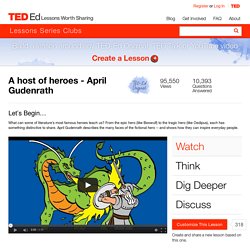
Another way of thinking about archetypes is to imagine that in some way it is possible to plot the important aspects of a story onto a graph. If enough points from several stories were plotted a pattern would start to appear. If one then drew a line that approximated the pattern that emerged in the points, that best fit line would be an archetype. Epic Traditions: The Hero. The Heroic Tradition. Since the late 1970s Gregory Nagy has taught a Harvard course called “Concepts of the Hero in Classical Greek Civilization,” passing his enthusiasm for the classics on to thousands upon thousands of students.
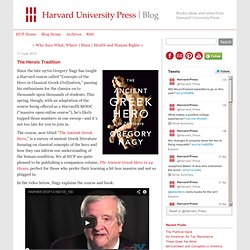
This spring, though, with an adaptation of the course being offered as a HarvardX MOOC (“massive open online course”), he’s likely topped those numbers in one swoop—and it’s not too late for you to join in. Www.mhhe.com/mayfieldpub/mythology/instructors_resources/harrispt1ch10.pdf. Herakles. The three general characteristics of the hero are (1) s/he is extreme, in both good and bad ways; (2) s/he is unseasonal; and (3) s/he has a ritually antagonistic relationship with the god or goddess most like him/her.
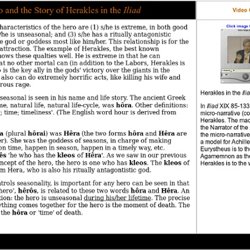
This relationship is for the hero a sort of fatal attraction. The example of Herakles, the best known Panhellenic hero, shows these qualties well. He is extreme in that he can accomplish feats that no other mortal can (in addition to the Labors, Herakles is also the mortal who is the key ally in the gods' victory over the giants in the Gigantomachy). He also can do extremely horrific acts, like killing his wife and children in a murderous rage. That Herakles is unseasonal is seen in his name and life story. The goddess of hôra (plural hôrai ) was Hêra (the two forms hôra and Hêra are related to each other). That Hera, who controls seasonality, is important for any hero can be seen in that the word meaning 'hero', hêrôs , is related to these two words hôra and Hêra .
Hero. Essay Example. Characteristics of a Greek Hero by Kaite Baldwin on Prezi. Dr. J's Illustrated Lectures. Four Conceptions of the Heroic. Four Conceptions of the Heroic by Vera Norman Adapted from a presentation given at the February 2003 FORum.
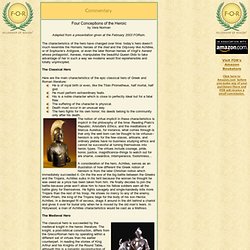
Heroes and the Homeric Iliad. Greek heroes. Greek Heroes and Heroines. Home | Greek Heroes This is a list of links for the section on Greek heroes and heroines.
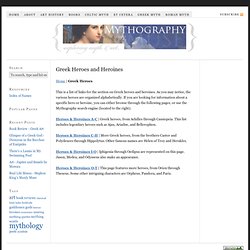
As you may notice, the various heroes are organized alphabetically. If you are looking for information about a specific hero or heroine, you can either browse through the following pages, or use the Mythography search engine (located to the right). Heroes & Heroines A-C | Greek heroes, from Achilles through Cassiopeia. This list includes legendary heroes such as Ajax, Ariadne, and Bellerophon. Heroes & Heroines C-H | More Greek heroes, from the brothers Castor and Polydeuces through Hippolytus.
Heroes & Heroines I-O | Iphigenia through Oedipus are represented on this page. Heroes & Heroines O-T | This page features more heroes, from Orion through Theseus. The Greek Heroes by Charles Kingsley. Greek Heroes in Ancient Greek Mythology. The Greek heroes were playing a significant part in the Greek myths and folk tales.
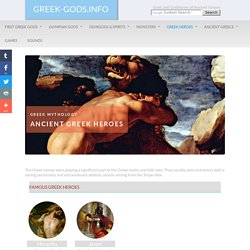
They usually were characters with a daring personality and extraordinary abilities, mostly arising from the Trojan War. Greek Mythology: Heroes. The Concept of the Hero in Greek Civilization. When we consider the Hero in ancient Greek culture, from the start we must 'de-familiarize' our notion of what a hero is.
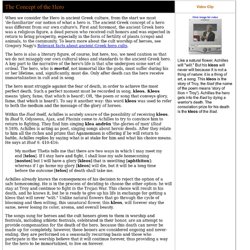
The ancient Greek concept of a hero was different from our own culture's. First and foremost, the ancient Greek hero was a religious figure, a dead person who received cult honors and was expected in return to bring prosperity, especially in the form of fertility of plants (crops) and animals, to the community. To learn more about the cult worship of heroes, see Gregory Nagy's Relevant facts about ancient Greek hero cults . The hero is also a literary figure, of course, but here, too, we need caution so that we do not misapply our own cultural ideas and standards to the ancient Greek hero.